Transformative outdoor experiences require a keen eye on safety and the preservation of natural resources. To promote this awareness, Gear Tips launched the Empowerment Program in 2023. In just one year, the program has trained 100 students in the Leave No Trace – Level 1 and 2 Instructor courses, Mountain Environment Orientation and Navigation Course (CONAM), and Advanced Wilderness First Aid (WAFA).
Aimed at training professionals in the outdoor market and nature activity practitioners, the goal of the Empowerment Program is to educate individuals so they can promote or engage in their adventures in a safer, more technical, and conscious manner, making them unforgettable.
After theoretical and practical immersion in these skills, participants of the Empowerment Program receive national or international certifications, and Gear Tips Club partners are endorsed with quality seals. “Developing them is a way to support and ensure the quality of the experiences offered. On the Empowerment Program website, people have access to all trained professionals to make informed decisions when choosing guides and instructors,” explains Pedro Lacaz Amaral, founder of Gear Tips.
All courses are based on Brazilian standards governing adventure tourism, mountaineering, and other nature activities, as well as on international institutions such as Outward Bound, NOLS, UIAA, and the U.S.-based NGO Leave No Trace, of which Gear Tips is the only affiliated company in Brazil.
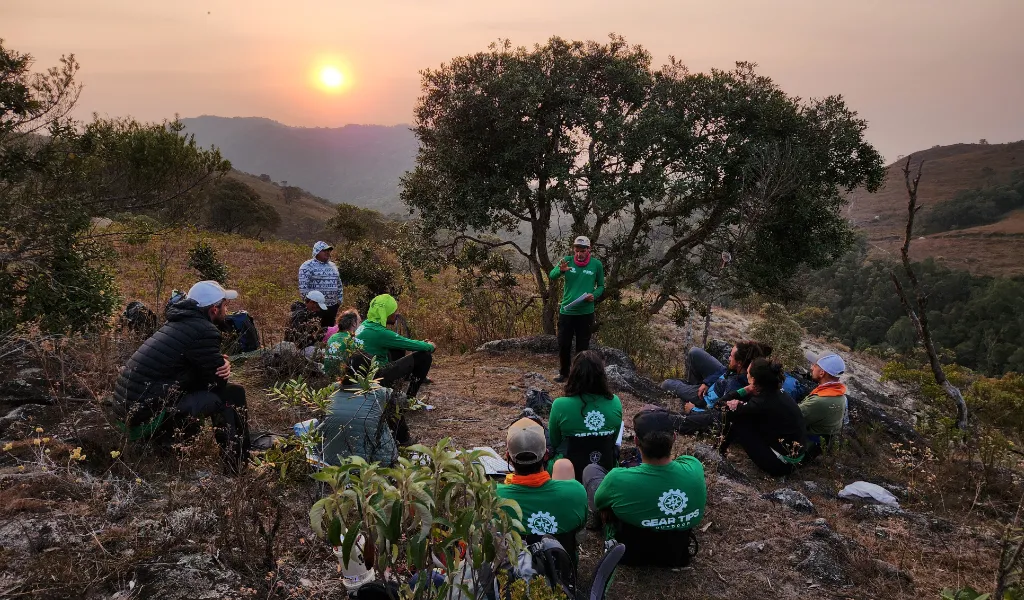
Leave No Trace course class
Leave No Trace in the Empowerment Program – Low-Impact Practices for Nature Experiences
The first course offered by the Empowerment Program was the Leave No Trace – Instructor Level 1, which has increasingly attracted professionals and outdoor enthusiasts concerned with minimizing the impact of their immersion in nature.
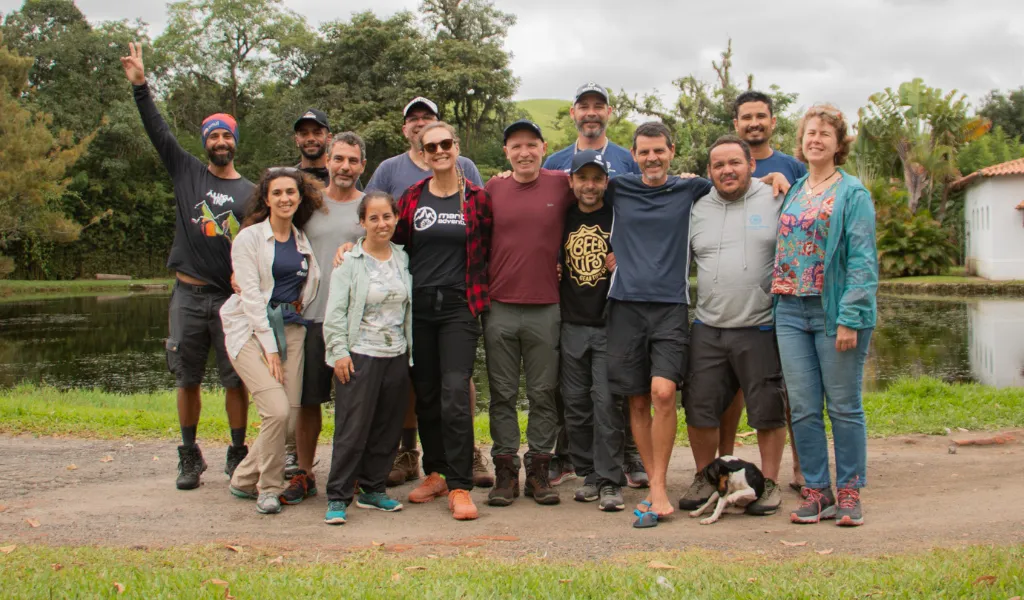
First cohort of the Leave No Trace – Instructor Level 1 Course – Empowerment Program
“With the growing number of people engaging in outdoor activities and many new guides and instructors entering the market, learning about low-impact techniques and how to behave in nature is crucial. Many even know what not to do, but there is little in-depth knowledge on the subject,” says Pedro.
For Bruno Negreiros, responsible for organizing, managing, and conducting the Empowerment Program courses, the impact of Leave No Trace on participants’ personal and professional lives lies in fostering the necessary awareness for nature activities to be 100% sustainable.
Mountaineer since 2008 and president of the Clube Excursionista Carioca, Ciça Ferreira, points out that while the concept of low impact is implicit in nature activities, the topic is still somewhat neglected. “As a park visitor, I notice that knowledge is not widespread. We see many people committing atrocities, such as littering on trails, feeding animals, making noise, among other harmful behaviors.”
For Moaci Judson, coordinator of the Leave No Trace courses, the content is essential for the general public to understand the best practices for being in nature, learning how to better use resources to minimize their impact. For professionals, it is also an opportunity to expand their repertoire with techniques and skills to offer to their clients.
The coordinator explains that the 7 principles of Leave No Trace go beyond common sense, challenging paradigms through practices that enhance our awareness of how to be in nature sustainably. “When we talk about the impacts of campfires, for example, we are not saying not to make them. We teach techniques to reduce the impact while respecting local limitations. The same applies to waste: we go beyond proper disposal. We are talking about ethics and responsibility, teaching effective and often unknown techniques.”
Vinicius Viegas, president of ABETA (Associação Brasileira das Empresas de Ecoturismo e Turismo de Aventura) and Nattrip, one of the leading tourism operators in Rio de Janeiro, highlights the points emphasized by Moaci as key aspects of Leave No Trace. Viegas participated in the Level 1 Instructor course alongside Nattrip guides at Parque Estadual dos Três Picos.
“We were already familiar with some low-impact practices, but during the course, we gained more qualified technical knowledge. We know we need to plan for an expedition, but how do we do that? The same applies to setting up a campsite, packing out trash, disposing of organic waste, preparing a bathroom, respecting animals, etc. The course provided a deeper understanding of these issues.”
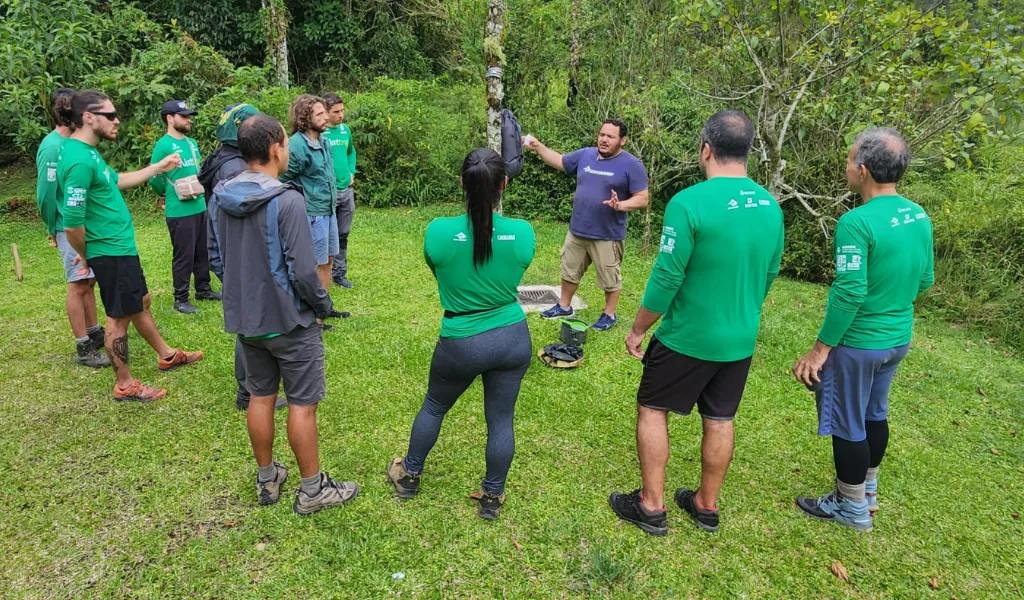
Nattrip professionals during the Leave No Trace – Level 1 Instructor training
Why Leave No Trace courses are attracting more and more participants
1. Behavioral changes and the awakening to new alternatives
According to research conducted by the Leave No Trace NGO, a person who participates in its courses is five times more likely to preserve nature, expanding their environmental awareness. “Today, the learning is integrated into people’s habits. You start thinking about how much waste you generate daily, for example,” says Pedro Lacaz Amaral.
While coordinating the Leave No Trace – Level 1 and 2 Instructor courses, Moaci observes that there is deep reflection that leads participants to significant changes in behavior. “It is very common for experienced outdoor professionals to say they have been doing something their whole lives and are now rethinking their actions. They realize it’s not about right or wrong, but about being open to seeing that there are other possibilities.”
The Nattrip team of guides working in Serra dos Órgãos is a practical example of how actions can be reconsidered and improved. “During expeditions, we are required to carry a sheet tub and bring back our feces, which the guides were already handling well. After the course, we began managing the collection more effectively,” says Vinicius Viegas.
Today, the guides take the containers to a composting facility that transforms all the clients’ collected feces throughout the year into organic material for planting native trees in the region. “This is a concrete example of the knowledge we gained. The project had already started, but it was improved after the course,” Viegas concludes.
According to Ciça Ferreira, the Clube Excursionista Carioca has already scheduled low-impact activities for the next CBM – Basic Mountaineering Course classes. “Previously, this part of the course was theoretical, and now the proposal is to have practical activities, reinforcing the content with a focus on spreading the knowledge.”
2. In Leave No Trace, participants take the lead
In Leave No Trace courses, participants are engaged even before the course begins. In the collaborative methodology applied to the content, the classes are prepared by the students themselves based on all the material available on the online platform Gear Tips Academy. “The experiences are always different because people have distinct backgrounds and contribute in diverse ways. They actively participate in discussions and engage in broad and enriching debates,” says Moaci.
With each new group, Bruno Negreiros is impressed by the quality and creativity of the instructions. “I love seeing the methodology in action through collective construction. I am a strong advocate of this method and would apply it to any training in my life because it truly makes a difference!”
The course also promotes various practical activities, making learning more dynamic and moving away from the conventional hierarchical teaching model, where the instructor solely leads the content. “The relaxed teaching approach fosters interaction among all participants, providing knowledge, experience exchange, and connection,” says Vinicius from Nattrip.
For Ciça Ferreira, the highlight of Leave No Trace is precisely how the content is delivered, using different teaching and learning methodologies. “The exchange of knowledge with people who have different levels of experience greatly enriches the course.”
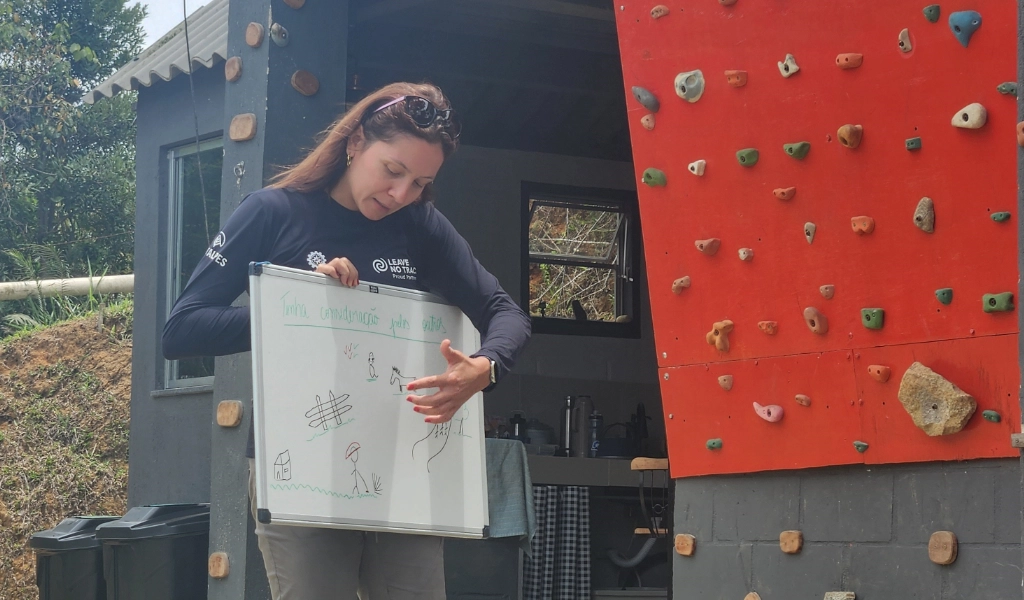
Ciça Ferreira during the Leave No Trace course
3. Scientific research, highly trained instructors, and continuous updates
The Leave No Trace NGO stands out from other initiatives in Brazil because it offers a threefold approach involving research, education, and outreach. This allows access to updated scientific data and the opportunity to reach various sectors of society.
In its first year, new dynamics and experiences were adopted in the Empowerment Program, along with the training of new Level 2 instructors responsible for spreading the content throughout Brazil. “We want Leave No Trace’s movement and presence in Brazil to grow so that we can become a reference for low-impact practices, bringing more programs and opportunities related to environmental education,” explains Bruno Negreiros.
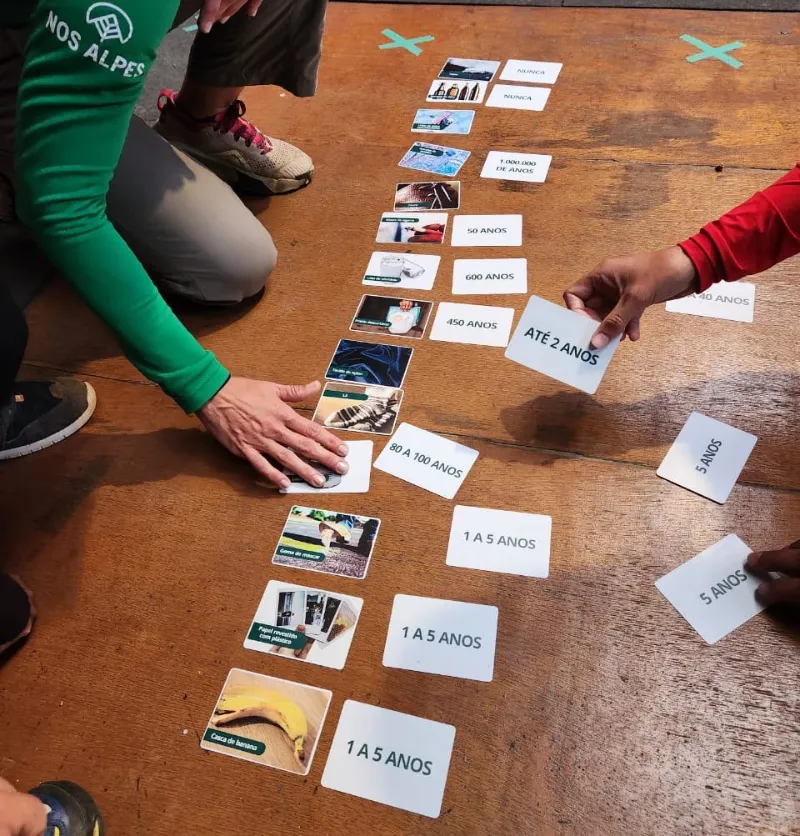
Activity applied in the Leave No Trace – Level 1 Instructor course
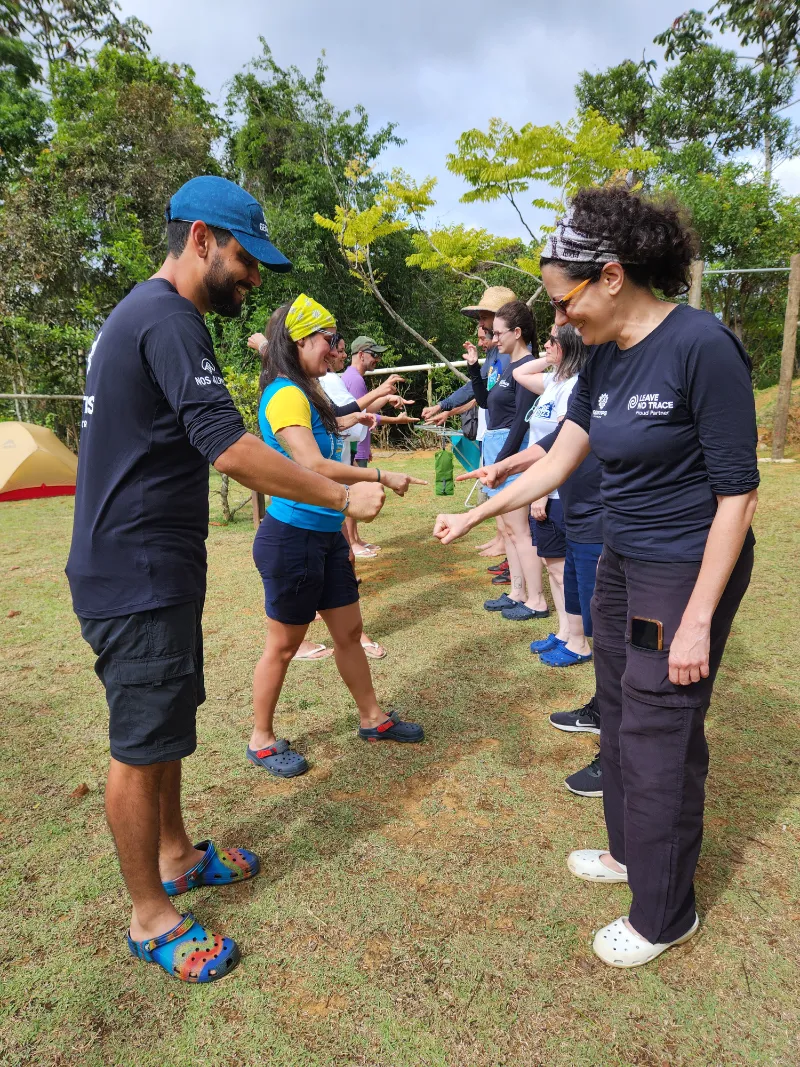
Activity applied in the Leave No Trace – Level 1 Instructor course
Pedro Lacaz Amaral says that promoting Leave No Trace principles has always been part of his plans, and that the partnership with the international NGO provided growth in educational structure and the training of in-house instructors to expand knowledge on low-impact practices.
“To expand the concept of Leave No Trace, we needed more qualified instructors. With this in mind, we brought the Leave No Trace – Level 2 Instructor Course to Brazil. In 2024, we trained 13 new instructors with our own funding. In return, each of them must conduct five Level 1 instructor courses, allowing us to offer 50 to 60 new beginner courses across Brazil.”
In addition to in-person courses, the Gear Tips Academy platform is constantly updated, providing articles and new tools to keep participants up to date.
Partnership with national parks
Through continuous interaction with the Leave No Trace NGO, Pedro became closely involved with the work carried out with professionals from national parks, state parks, and conservation units, bringing the initiative to Brazil.
The Tijuca National Park was the first to join this movement. So far, three groups of park rangers and other professionals who need to be prepared to correctly instruct visitors, guides, and instructors bringing clients to the attraction have been trained. The next institution to receive the Leave No Trace – Level 1 Instructor course will be the Serra dos Órgãos National Park. “We are already in talks with other national and state parks in various Brazilian states,” says Pedro.
Dirlei Conceição da Silva, who works at the reception of the Tijuca Forest Visitor Center (Parna Tijuca), emphasizes that the course greatly enhanced his development. “I have been at Tijuca National Park for 16 years, and this was one of the most valuable courses I have ever taken. The Leave No Trace course, within the Empowerment Program, made us reflect on what we do today and how we can rethink certain actions.”
Dirlei also works in sustainable tourism and says the course opened his eyes to promoting new initiatives. “I am on the front line of tourist services and lead a sustainable community-based initiative. Developing new strategies is now happening in an inspiring way.”
Virginia Talbot, Public Use Coordinator at Serra dos Órgãos National Park (PARNASO), points out that training is crucial, especially in the environmental field, where people are increasingly aware of the impacts caused by unsustainable practices.
“The course introduced a methodology that prioritized hands-on learning, which is the best way to internalize content. We were very excited and hope for more editions. Park staff need training. Many of us have never had formal instruction. Knowledge takes us out of our comfort zone.”
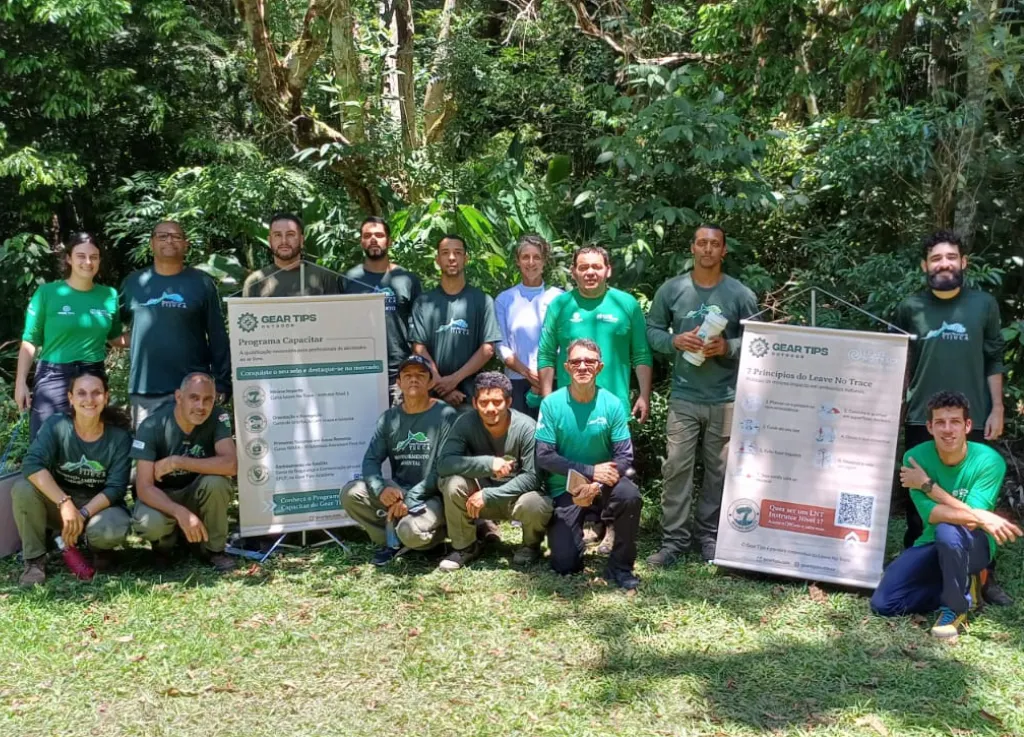
What’s next for the Empowerment Program
Despite the challenges of offering subsidized and sponsored courses, Bruno Negreiros celebrates the achievements of the first year and is already planning the future. “We did an incredible job training 100 students, which is very difficult in the outdoor market. We see that people are increasingly interested in and seeking out our courses. There are many opportunities ahead. The Empowerment Program aims to train high-quality groups with market professionals so that this knowledge continues to multiply.”
Expanding across Brazil
In the coming years, the goal of the Empowerment Program, especially with Leave No Trace courses, is to reach various regions of Brazil. “We want to reach as many participants as possible, which is why we geographically decentralized the instructor training. For example, we have two instructors in Chapada Diamantina and in southern Brazil,” says Pedro. Additionally, the work with national parks is also expected to grow.
New courses in the Empowerment Program
The founder of Gear Tips says the plan is also to introduce new courses, such as Meteorology for Outdoor Activities, Outdoor Cooking, and others focused on expedition planning, with complementary skills essential for professionals and outdoor activity participants. Furthermore, the aim is to extend the Leave No Trace concept to other markets, such as the trail running community.
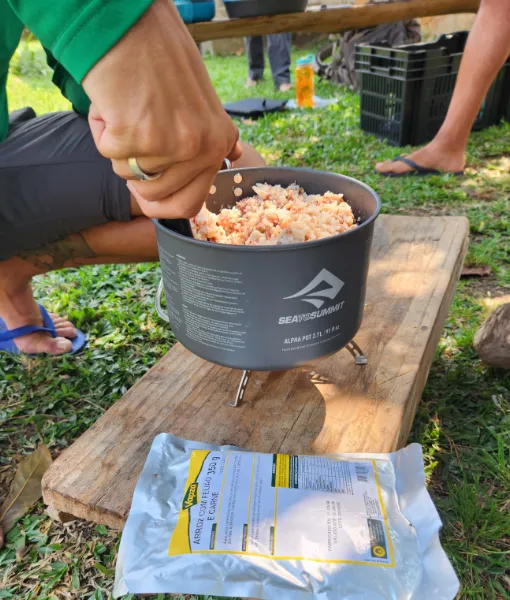
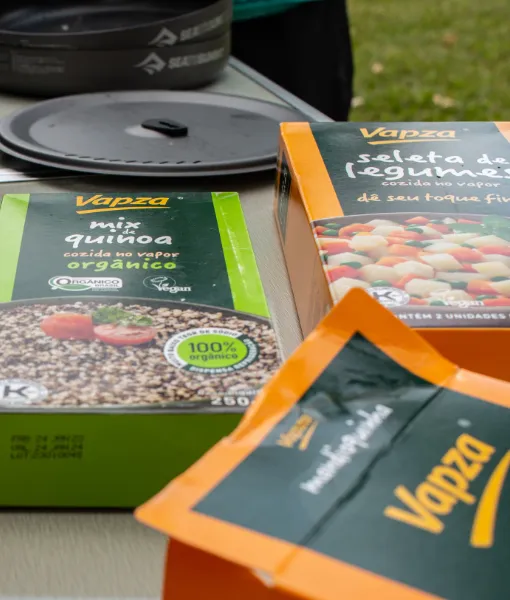
How to Participate in the Empowerment Program Courses?
Outdoor market professionals: The Empowerment Program’s spots for professionals are subsidized through a scholarship fund created by Gear Tips: for every sale of any service, 10% of the revenue is allocated to this fund, in addition to resources from partner companies and sponsors. This makes the investment more accessible and, in some cases, even free.
General public: If you want to participate in the Empowerment Program courses, stay tuned, as four spots are offered per cohort. And, of course, Gear Tips Club subscribers get a discount. It is worth noting that this is a training opportunity that allows you to have transformative experiences in nature while indirectly contributing to the professionalization of the market.
You May Also Be Interested In
In addition to the Empowerment Program courses, Gear Tips Academy offers the free Safety and Communication via SPOT training, ideal for helping you be located in communication-free environments, among other essential courses to ensure you have unforgettable and safe experiences in nature.
This post is also available in: Português (Portuguese (Brazil)) Español (Spanish)
